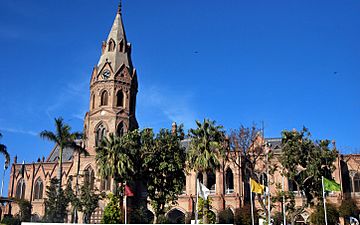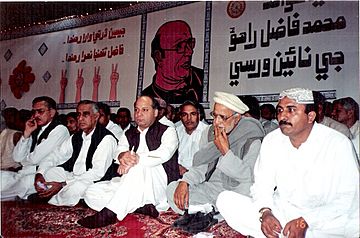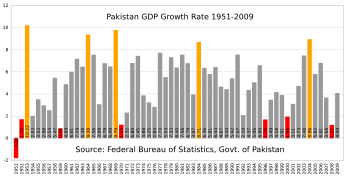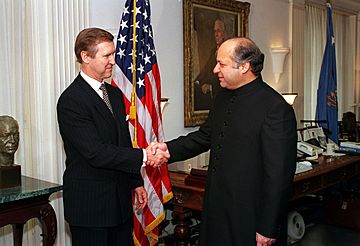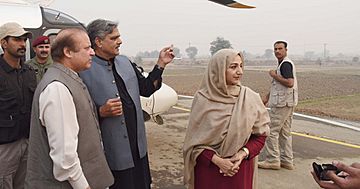Nawaz Sharif facts for kids
Quick facts for kids
Nawaz Sharif
|
|
|---|---|
|
نواز شریف
|
|
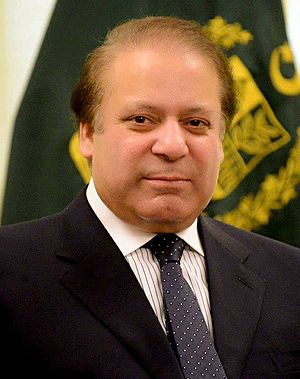
Official portrait, 2013
|
|
| Chief Of Lahore Heritage Revival Authority | |
| Assumed office 16 March 2025 |
|
| President | Asif Ali Zardari |
| Prime Minister | Shehbaz Sharif |
| Deputy | Mian Tahir Jamel |
| Chief Minister | Maryam Nawaz |
| Preceded by | Rana Sanaullah |
| 12th Prime Minister of Pakistan | |
| In office 5 June 2013 – 28 July 2017 |
|
| President | Asif Ali Zardari Mamnoon Hussain |
| Preceded by | Mir Hazar Khan Khoso (caretaker) |
| Succeeded by | Shahid Khaqan Abbasi |
| In office 17 February 1997 – 12 October 1999 |
|
| President | Farooq Leghari Wasim Sajjad (acting) Rafiq Tarar |
| Preceded by | Malik Meraj Khalid (caretaker) |
| Succeeded by | Pervez Musharraf (chief executive) |
| In office 6 November 1990 – 18 July 1993 |
|
| President | Ghulam Ishaq Khan |
| Preceded by | Ghulam Mustafa Jatoi (Caretaker) |
| Succeeded by | Moeenuddin Ahmad Qureshi (caretaker) |
| Leader of the Opposition | |
| In office 19 October 1993 – 5 November 1996 |
|
| Preceded by | Benazir Bhutto |
| Succeeded by | Benazir Bhutto |
| President of Pakistan Muslim League (N) | |
| In office 2017–2018 – 28 May 2024–present |
|
| Preceded by | Shehbaz Sharif |
| In office 27 July 2011 – 16 August 2017 |
|
| Preceded by | Javed Hashmi |
| Succeeded by | Sardar Yaqoob (interim) |
| In office 6 October 1993 – 12 October 1999 |
|
| Preceded by | Post created |
| Succeeded by | Kulsoom Nawaz Sharif |
| 9th Chief Minister of Punjab | |
| In office 9 April 1985 – 13 August 1990 |
|
| Governor | Ghulam Jilani Khan Sajjad Hussain Qureshi Tikka Khan |
| Preceded by | Sadiq Hussain Qureshi |
| Succeeded by | Ghulam Haider Wyne |
| Member of the National Assembly of Pakistan | |
| Assumed office 29 February 2024 |
|
| Preceded by | Waheed Alam Khan |
| Constituency | NA-130 Lahore-XIV |
| In office 1 June 2013 – 28 July 2017 |
|
| Preceded by | Bilal Yasin |
| Succeeded by | Kalsoom Nawaz |
| Constituency | NA-120 Lahore-III |
| In office 1993–1997 |
|
| Constituency | NA-95 Lahore-IV |
| In office 1997–1999 |
|
| Constituency | NA-95 Lahore-IV |
| Provincial Minister for Finance of Punjab | |
| In office 1981–1985 |
|
| Personal details | |
| Born |
Mian Muhammad Nawaz Sharif
25 December 1949 Lahore, Punjab, Pakistan |
| Political party | |
| Other political affiliations |
|
| Spouse | |
| Children | 4 (including Maryam Nawaz) |
| Relatives | See Sharif family |
| Alma mater | Govt. College University University of the Punjab |
| Signature |  |
Mian Muhammad Nawaz Sharif (Urdu, Punjabi: میاں محمد نواز شریف; born 25 December 1949) is a Pakistani businessman and politician who served as the Prime Minister of Pakistan for three non-consecutive terms. He is the longest-serving prime minister of Pakistan, having served a total of more than 9 years across three tenures. Each term has ended in his ousting.
He is the elder brother of Shehbaz Sharif, who also served as prime minister of Pakistan from 2022 to 2023 and from 2024 to present.
In 2017, Nawaz was removed from office by the Supreme Court of Pakistan regarding revelations from the Panama Papers case. In 2018, the Pakistani Supreme Court disqualified Nawaz from holding public office, and he was also sentenced to ten years in prison by an accountability court. Since 2019, Nawaz was in London for medical treatment on bail. He was also declared an absconder by a Pakistani court, however, the Islamabad High Court (IHC) granted him protective bail till October 24 in the Avenfield and Al-Aziza cases. In 2023, after four years of exile, he returned to Pakistan.
He is current Patron-In-Chief Of Lahore Heritage Revival Authority since 16 March 2025.
Contents
Early life and education
Nawaz was born in Lahore, Punjab, on 25 December 1949. The Sharif family are Kashmiris of Punjab. His father, Muhammad Sharif, was an upper-middle-class businessman and industrialist whose family had emigrated from Anantnag in Kashmir for business. They settled in the village of Jati Umra in Amritsar district, Punjab, at the beginning of the twentieth century. His mother's family came from Pulwama. After the creation of Pakistan in 1947, Nawaz's parents migrated from Amritsar to Lahore. His father followed the teachings of the Ahl-i Hadith. His family owns Ittefaq Group, a multimillion-dollar steel conglomerate, and Sharif Group, a conglomerate with holdings in agriculture, transport and sugar mills. He has two younger brothers: Shehbaz Sharif and the late Abbas Sharif, both politicians by profession.
Nawaz went to Saint Anthony High School. He graduated from the Government College University (GCU) with an art and business degree and then received a law degree from the Law College of Punjab University in Lahore.
Provincial politics
Early political career
Nawaz suffered financial losses when his family's steel business was appropriated under the nationalisation policies of former prime minister Zulfikar Ali Bhutto. Nawaz entered politics as a result, initially focused on regaining control of the steel plants. In 1976, Nawaz joined the Pakistan Muslim League (PML), a conservative front rooted in the Punjab province.
In May 1980, Ghulam Jilani Khan, the recently appointed military governor of Punjab and a former Director-General of the Inter-Services Intelligence (ISI), was seeking new urban leaders; he quickly promoted Nawaz, making him finance minister. In 1981, Nawaz joined the Punjab Advisory Council under Khan.
In 1981, Nawaz was appointed by President Zia as the minister of finance for the province of Punjab. Backed by a loose coalition of conservatives, Nawaz was elected as the Chief Minister of Punjab in 1985 and re-elected after the end of martial law in 1988.
As chief minister, Nawaz stressed welfare and development activities and the maintenance of law and order. Khan beautified Lahore, extended military infrastructure, and silenced political opposition, while Nawaz expanded economic infrastructure to benefit the army, his own business interests, and the people of Punjab.
First term as prime minister (1990–1993)
In 1990, Nawaz led the conservative Islamic Democratic Alliance and became the 12th prime minister of Pakistan.
During his tenure, Nawaz introduced an economy based on privatisation and economic liberalisation to reverse the nationalisation by Zulfikar Bhutto, notably for banks and industries. He legalised foreign money exchange to be transacted through private money exchangers. His privatisation policies were continued by both Benazir Bhutto in the mid-1990s and Shaukat Aziz in the 2000s. He also improved the nation's infrastructure and spurred the growth of digital telecommunication.
Nawaz continued the simultaneous Islamization and conservatism of Pakistan society, a policy begun by Zia. He introduced Islamic laws such as the Shariat Ordinance and Bait-ul-Maal (to help poor orphans, widows, etc.) to drive the country on the model of an Islamic welfare state. Moreover, he gave tasks to the Ministry of Religion to prepare reports and recommendations for steps taken toward Islamization.
Nawaz made the nuclear weapons and energy programme one of his top priorities. He expanded the nuclear energy program, and continued an atomic programme while following a policy of deliberate nuclear ambiguity.
This resulted in a nuclear crisis with the United States which tightened its embargo on Pakistan in December 1990 and reportedly offered substantial economic aid to halt the country's uranium enrichment programme. Responding to US embargo, Nawaz announced that Pakistan had no atomic bomb, and would sign the Nuclear Nonproliferation Treaty if India did as well. In 1993, Nawaz established the Institute of Nuclear Engineering (INE) to promote his policy for the peaceful use of nuclear energy.
Constitutional crisis and resignation
After being ousted in 1993, when President Ghulam Ishaq Khan dissolved the National Assembly, Nawaz served as the leader of the opposition to the government of Benazir Bhutto from 1993 to 1996.
Second term as prime minister (1997–1999)
Nawaz returned to the premiership after the Pakistan Muslim League (N) (PML-N) was elected in 1997.
Nawaz's political prestige reached its peak when the country went nuclear. Despite the intense international criticism and decline in foreign investment and trade, Nawaz's domestic popularity increased, as the tests made Pakistan the first Muslim country and seventh nation to become a nuclear power. Editorials were full of praise for the country's leadership and advocated the development of nuclear deterrence.
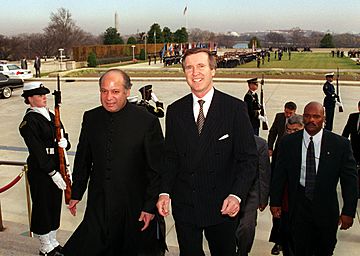
Nawaz built Pakistan's first major motorway, the M2 Motorway (3MM), called the Autobahn of South Asia. This public-private project was completed in November 1997 at a cost of US$989.12 million. His critics questioned the layout of the highway, its excessive length, its distance from important cities, and the absence of link roads with important towns.
Due to economic pressures, Nawaz halted the national space programme. This forced the Space Research Commission to delay the launch of its satellite, Badr-II(B), which was completed in 1997. This caused frustration among the scientific community who criticised Nawaz's inability to promote science. Senior scientists and engineers attributed this to "Nawaz's personal corruption" that affected national security.
By the end of Nawaz's second term, the economy was in turmoil. The government faced serious structural issues and financial problems; inflation and foreign debt stood at an all-time high, and unemployment in Pakistan had reached its highest point. The International Monetary Fund (IMF) had suspended aid, demanding the country's finances be resolved. The country was heading for financial default.
Coup, trial and exile
The simultaneous conflicts in the Kargil war with India and Afghanistan's civil war, along with economical turmoil, turned public opinion against Nawaz and his policies. In October 1999, Nawaz was deposed by Pervez Musharraf and martial law was established throughout the country.
The military placed Nawaz on trial for "kidnapping, attempted murder, hijacking and terrorism and corruption". In a speedy trial, the military court convicted Nawaz and gave him a life sentence.
Nawaz was also tried for tax evasion on the purchase of a helicopter worth US$1 million. The Lahore High Court agreed to acquit him if he could prove his innocence, but Nawaz was unable to cite any substantial evidence. He was ordered to pay a fine of US$400,000 on grounds of tax evasion, and he was sentenced to 14 years of imprisonment.
Pakistan and Saudi Arabia, under Nawaz and King Fahd, had enjoyed extremely close business and cultural relations that is sometimes attributed as a special relationship. Saudi Arabia was shocked at the news of the coup. Amid pressure by Fahd and US President Bill Clinton, the military court avoided a death sentence for Sharif. Fahd had expressed concern that the death sentence would provoke intense ethnic violence in Pakistan as had happened in the 1980s following the execution of Zulfikar Ali Bhutto. Under an agreement facilitated by Saudi Arabia, Nawaz was placed in exile for the next 10 years, and agreed not to take part in politics in Pakistan for 21 years. He also forfeited property worth US$8.3 million (£5.7 million) and paid a fine of US$500,000. Nawaz travelled to Jeddah, Saudi Arabia, where he was taken to a residence managed and controlled by the Saudi government, and provided a Saudi loan to establish a steel mill.
Return to Pakistan
Third term as prime minister (2013–2017)
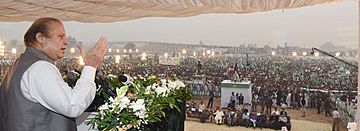
After being exiled for more than a decade, Nawaz returned to politics in 2011 and led his party to victory for the third time in 2013.
Nawaz's third term moved from social conservatism to social centrism. In 2016, he called the future of Pakistan as one underpinned as an "educated, progressive, forward looking and an enterprising nation". In January 2016 he backed the Punjab government policy of banning Tablighi Jamaat from preaching in educational institutions and in February he enacted a law to provide a helpline for women to report domestic abuse, despite the criticism of conservative religious parties.
Nawaz stressed the need for operation Zarb-e-Qalam to fight societal extremism and intolerance through the power of "writers, poets and intellectuals". Addressing the Pakistan Academy of Literature, Nawaz said that "in a society where flowers of poetry and literature bloom, the diseases of extremism, intolerance, disunity and sectarianism are not born". Nawaz also announced a Rs 500 million endowment fund for the promotion of art and literary activities in Pakistan.
In November 2013, Nawaz broke ground on a US$9.59 billion nuclear power complex in Karachi, designed to produce 2200 MW of electricity. During the groundbreaking ceremony, Nawaz stated that Pakistan would construct six nuclear power plants during his term in office. He went on to say that Pakistan has plans to construct a total of 32 nuclear power plants by 2050, which will generate more than 40,000 MW.
Shortly after taking power in 2013, Nawaz received a US$6.6 billion loan from the International Monetary Fund (IMF) to avoid a balance-of-payments crisis.
The Sharif administration negotiated free trade agreements (FTAs) to expand trade liberalisation, notably with Turkey, South Korea, Iran, and Thailand, and an expansion of the FTA with Malaysia.
During a trip to Pakistan on 10 February 2016, World Bank Group's president Jim Yong Kim applauded the economic policies of Nawaz's government. He claimed that Pakistan's economic outlook had become more stable. On 19 March, Nawaz approved tax incentives in an attempt to attract new automotive manufacturing plants to the country.
On 15 December 2016, Pakistan became a signatory of the Organisation for Economic Co-operation and Development's (OECD) Convention on Mutual Administrative Assistance in Tax Matters, aimed at curbing tax evasion.
In 2017, Nawaz was removed from office by the Supreme Court of Pakistan regarding revelations from the Panama Papers case. In 2018, the Pakistani Supreme Court disqualified Nawaz from holding public office, and he was also sentenced to ten years in prison by an accountability court. As of 2021[update], Nawaz is in London for medical treatment on expired bail.
Pakistan Vision 2025
In August 2014, the Sharif administration unveiled an ambitious programme to enhance exports to US$150 billion by 2025. The programme is based on seven pillars: putting people first; developing human and social capital; achieving sustained, indigenous and inclusive growth; governance, institutional reform and modernisation of the public sector; energy, water and food security; private-sector-led growth and entrepreneurship, developing a competitive knowledge economy through value addition and modernisation of transportation infrastructure and greater regional connectivity.
Personal life
Nawaz married Kulsoom Nawaz, who was also of Kashmiri descent, in April 1971. His brother Shehbaz Sharif served as Chief Minister of Punjab province four times and is currently the prime minister of Pakistan, while his nephew Hamza Shahbaz Sharif is currently Leader of the Opposition in the Provincial Assembly of the Punjab. Nawaz's daughter Maryam Nawaz is the current Central Vice President of PML-N. Maryam is married to politician Muhammad Safdar Awan. His other daughter, Asma Nawaz, is married to Ali Dar, son of Ishaq Dar, the former finance minister of Pakistan.
The personal residence of the Sharif family, Raiwind Palace, is located in Jati Umra, Raiwind, on the outskirts of Lahore. He also has a residence in Jeddah, Saudi Arabia, known as the Sharif Villa, where he lived during his years in exile. His elder son, Hussain Nawaz, is a businessman based in Saudi Arabia and currently resides in Jeddah. His younger son, Hassan Nawaz, is also a businessman and lives in London.
See also
 In Spanish: Nawaz Sharif para niños
In Spanish: Nawaz Sharif para niños
- List of international prime ministerial trips made by Nawaz Sharif
Images for kids
-
On 4 March 2017, Sharif's administration approved the merger of FATA (red) with Khyber Pakhtunkhwa.


